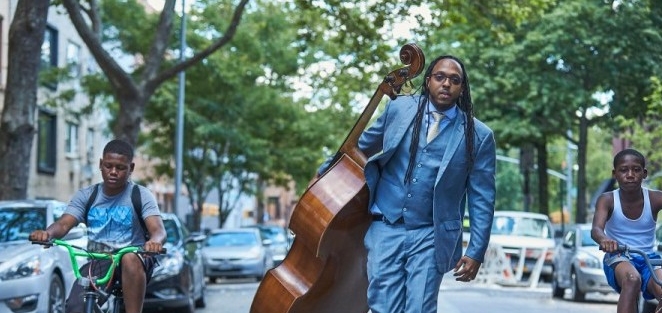The first instrument that bassist Corcoran Holt ever played was the djembe, a West African rope-bound drum. As a child playing with a Washington, D.C., dance troupe, Holt came to appreciate the spiritual connection that existed between himself and the instrument, the other players and the audience. Even though Holt’s career now embraces a multitude of different performance settings, this connection remains fundamental to his music.
“That’s where I play from, regardless of who I’m playing with,” he said after a recent gig at Ginny’s Supper Club in Harlem. “What’s important to me is giving myself and my spirit to those who are listening.” With his new album, The Mecca (HoltHouse Music), Holt demonstrates that a shared connection trumps musical athleticism at every turn.
Each of the tunes—including original compositions such as “Zuri Nia” and “14th Street Bounce”—bears its own sonic thumbprint. All of the players on the album are long-standing musical collaborators. And the groove and the group vibe are so right that the spirit soars.
Even though The Mecca is Holt’s first album as a leader, he’s hardly a newcomer to elite musicianship. The list of jazz artists he has worked with as a sideman is long and impressive: trombonists Wycliffe Gordon and Steve Turre, saxophonists Jimmy Heath and Benny Golson, pianists John Hicks and Eric Reed, drummers Jimmy Cobb and Al Foster, and guitarists Bucky Pizzarelli and Russell Malone. On his website he refers to these (and his many other) professional associations as career blessings.
One of the biggest blessings, perhaps, was his move in 2005 to New York City from his native D.C. to work on a master’s degree in jazz studies at Queens College. At the same time, a good buddy from his hometown—drummer McClenty Hunter Jr.—also was moving to New York to attend The Juilliard School. Before long, the two had distinguished themselves on New York’s competitive music scene, with both eventually landing spots in saxophonist Kenny Garrett’s quintet, which earned a Grammy nomination in 2013. This shared journey, from school to career success, provided the thematic inspiration for The Mecca.
“A lot people think the title refers to making a [pilgrimage] to Africa or Islam. But I’m really talking about New York City, because everybody on the record … came here for a reason,” Holt explained. “Through searching and trying to grow artistically, we all met each other.” Holt’s compositions—melodically infectious and harmonically sturdy—reflect a deep awareness of why people listen to music. “It comes from gospel, that understanding of how music can really touch the heart,” Hunter said regarding the album’s appeal. “Because of the social chemistry [among the players], it made it easier to transcend standard musical form.”
In discussions about the why and how of his music, Holt pays tribute to his ancestral, musical and philosophical elders—from his great-grandfather, a bassist who lived next door to John Coltrane, to Miles Davis and Malcolm X. “I like to honor these people,” he said. “They’re a part of what I’m doing now.” Though Holt often is strapped for time due to frequent touring and the birth of his first child earlier this year, he still manages to visit the Greater Harlem Center for Nursing and Rehabilitation to play drums for the elderly. When he plays, some patients who were previously unresponsive begin to move along with the rhythm. Holt marvels at the transformation: “The music is bringing them life.”
Photo: Donn Thompson/Drac Inc.
(Reprinted from the September 2018 issue of Downbeat magazine.)
